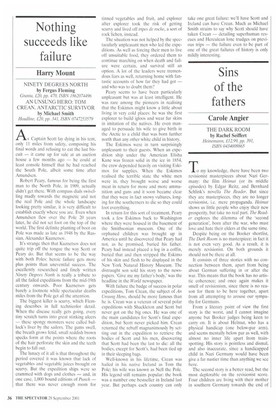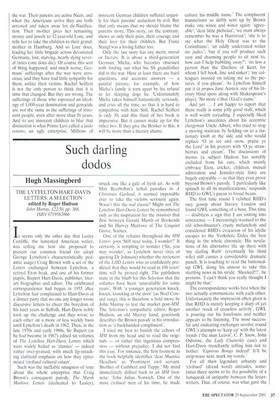Sins of the fathers
Carole Angier
THE DARK ROOM by Rachel Seiffert Heinemann, 412.99, pp. 391, ISBN 0434009865 To my knowledge, there have been two revisionist masterpieces about Nazi Germany: the film Heimat (or its middle episodes) by Edgar Reitz, and Bernhard Schlink's novella The Reader. But since they are masterpieces, they are no longer revisionist, i.e. mere propaganda. Heimat shows us little people who enjoy their new prosperity, but take no real part. The Reader explores the dilemma of the 'second generation', born after the war, who must love and hate their elders at the same time.
Despite being on the Booker shortlist, The Dark Room is no masterpiece; in fact it is not even very good. As a result, it is merely revisionist, On both grounds it should not be there at all.
It consists of three stories with no connection between them, apart from being about German suffering in or after the war. This means that the book has no artistic coherence; and once again makes it smell of revisionism, since there is no reason for them to be here together, apart from all attempting to arouse our sympathy for Germans.
From a literary point of view the first story is the worst, and I cannot imagine anyone but Booker judges being keen to carry on. It is about Helmut, who has a physical handicap (one below-par arm), and seems mentally below par as well, with almost no inner life apart from trainspotting. His story is pointless and dismal, and also inaccurate, since a handicapped child in Nazi Germany would have been give a far nastier time than anything we see here.
The second story is a better read, but the most deplorable on the revisionist score. Four children are living with their mother in southern Germany towards the end of
the war. Their parents are active Nazis, and when the Americans arrive they are both arrested and taken away for de-Nazificalion. Their mother gives her remaining money and jewels to 12-year-old Lore, and tells her to take the children to their grandmother in Hamburg. And so Lore does, leading her little brigade across devastated Germany, lost, starving, nearly dying several times (one does die). Of course this sort of thing happened, and much worse; Germans' sufferings after the war were atrocious, and they have had little sympathy for them, unlike their victims. Rachel Seiffert is not the only person to think that it is time that changed. But they are wrong. The sufferings of those who espoused an ideology of 1,000-year domination and genocide are not the same as the sufferings of innocent people, even after more than 56 years. And to use innocent children to blur that distinction is what Primo Levi called a laido conato, an ugly enterprise. Millions of innocent German children suffered unjustly for their parents' seduction by evil. But that only means that we should blame the parents more. This story, on the contraiy, shows us only their pain, their courage and their love for their children. But Franz Stang] was a loving father too.
Only the last story has any merit, moral or literary. It is about a third-generation German, Micha, who becomes obsessed with finding out what his SS grandfather did in the war. Here at least there are hard questions, and accurate answers — a painful picture, for example, of how Micha's family is torn apart by his refusal to let sleeping dogs lie. Unfortunately Micha takes himself fantastically seriously, and cries all the time, so that it is hard to sympathise with him. Still, Rachel Seiffert is only 30, and this third of her book is impressive. But it cannot make up for the other two. If they give the Booker to this, it will be more than a literary shame.







































































 Previous page
Previous page